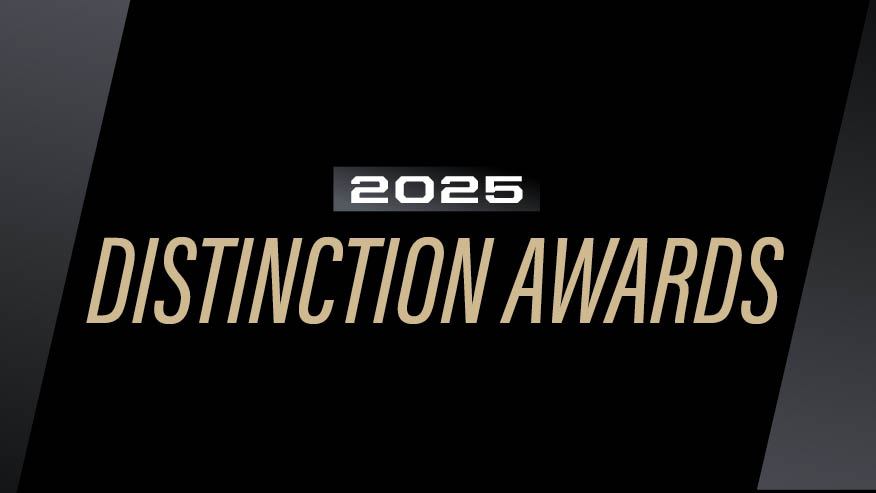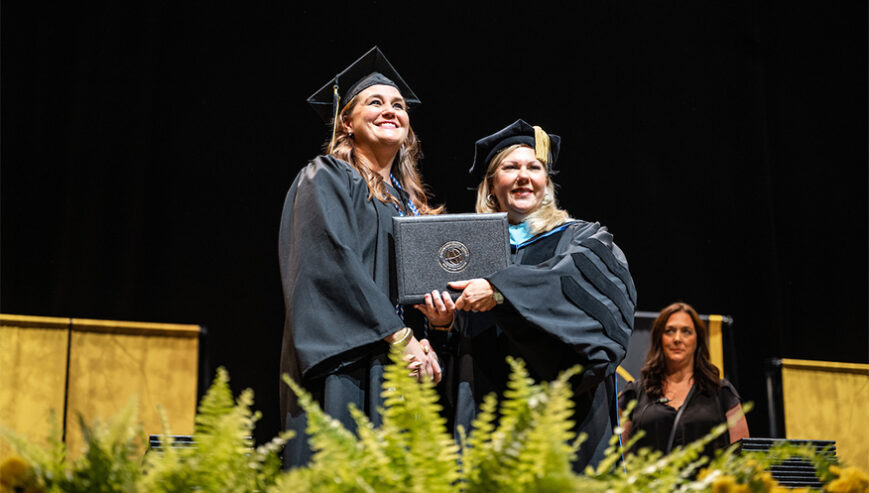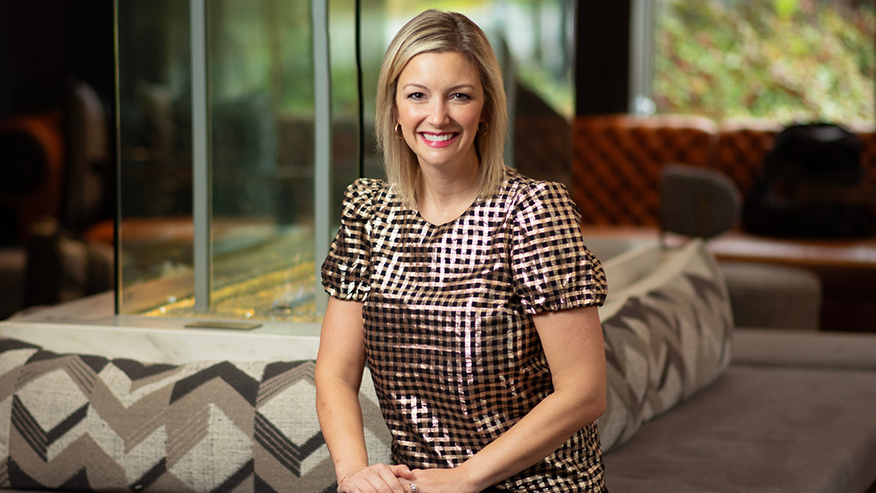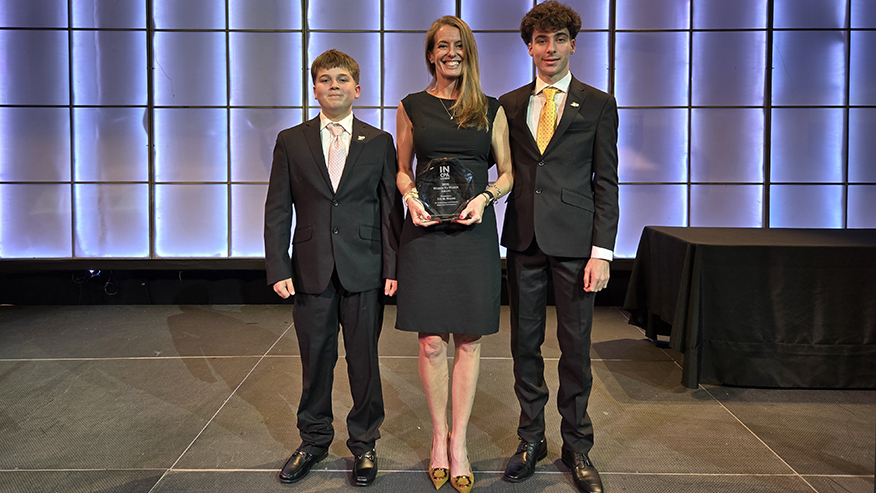Prepared, not shaken: Purdue Global Law School professor develops a firm foundation for bar exam prep
Meet law professor Quentin Huff, whose efforts help students achieve bar success
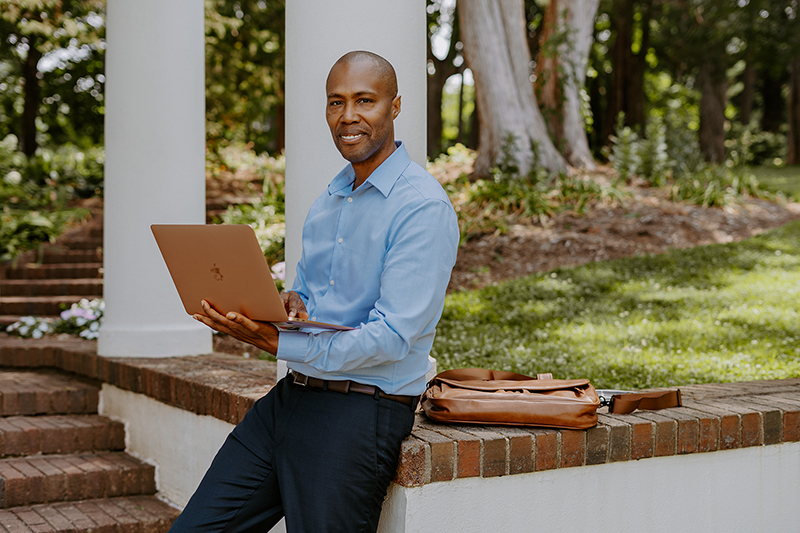
Quentin Huff, a law professor and director of bar support at Purdue Global Law School, helps prepare students for success on the bar exam. (Photo by Leonardo Macías)
WEST LAFAYETTE, Ind. —
Quentin Huff has a heart for understanding the way people learn, driving his passion in helping Purdue Global Law School students prepare for the bar exam following graduation.
“It is just the joy of seeing someone being able to overcome the bar exam, and then they go on to do the thing that they always wanted to do to elevate their career,” said Huff, who is a law professor and director of bar support at Purdue Global Law School.
ADDITIONAL INFORMATION
That’s why it’s important to him not just to be a professor, but also to take time to coach and mentor more than 50 students each term, so they’ll be best prepared for success when taking the bar exam.
Preparing students for success
Purdue Global Law School has numerous initiatives in place to help graduates pass the bar exam. These include developing a bank of supplemental study materials and integrating spaced repetition of bar-related material and skills throughout the law school curriculum, which culminates in a capstone course that serves as a transition to intensive bar study. The school offers a financial incentive to assist with the cost of a commercial bar prep program.
Prior to joining the law school, Huff had been helping students pass the bar exam at a brick-and-mortar American Bar Association (ABA) law school for nearly two decades. Even as a second-year student, he was already offering advice to classmates preparing for the bar. He brings that experience to bear as he works with Purdue Global Law School students.
“I was a nontraditional student myself at a traditional law school,” Huff said. “I think that helps me understand our students and what they need to be prepared to tackle the bar.”
Huff gets a sense of students’ needs as they move through courses, seeing their work product, strengths and weaknesses. He offers mentoring and coaching through both one-on-one and group meetings.
“The needs of students have changed as the environment has changed. Our students need some flexibility. They come into law school while working and have obligations,” Huff said. “I make it as accessible as possible.”
Active learning, which is built into the school’s system and curriculum, keeps students engaged. Huff has developed activities that mimic bar exam sessions, as well as ways to help students assess and critique their own work. Huff and other faculty members also host seminars and workshops that are recorded and made available for students to review.
“Purdue Global and the law school are always having conversations on issues we are working through,” Huff said. “The question always being asked is: ‘How will this help our students?’ That sets the foundation for what I’m doing.”
Huff says those conversations, as well as continued support for students beyond receiving their degree, are key to helping them have continual success.
“It’s really important for us to be able to show that our program works, that we’ve got the curriculum down, that we’ve got great professors, and that those bar pass rate numbers go up, because it also instills confidence amongst students,” Huff said. “Word starts getting around that ‘Hey, I received a great education, and on top of it, I had all of this support going into the bar exam.’”
Currently, Purdue Global Law School graduates are eligible to sit immediately for the bar exam in California and apply for a waiver to sit for the bar in Indiana. Each state has various requirements for bar eligibility.
Breaking down the numbers
For the February 2024 administration of the California bar exam, 53% of Purdue Global graduates taking the bar for the first time passed. By comparison, the first-time pass rate for all California-based ABA law school graduates was 55%, and the first-time pass rate for out-of-state (non-California) ABA law school graduates was 49%.
Purdue Global’s overall pass rate, including both first-time and repeat takers, was 36%. The California statewide overall pass rate was 34%.

“The main thing the numbers represent for me is that people have set some type of goal and they’re reaching that goal,” Huff said. “What I really like is that the goal they are aspiring to is more than just passing the bar exam.”
Huff encourages students to believe in themselves, pointing out the importance of leaning into the critical-thinking skills they already possess.
“We’re retooling the skills that they have,” Huff said. “We translate that into what they’re good at and build a customized approach for each student for the exam.”
Forward momentum
Huff said he finds joy and fulfillment in what he is doing because he is helping adult learners who aspire to be attorneys complete that piece of the puzzle, taking their careers to the next level.
“It’s rewarding because you know as soon as these individuals get their license and are sworn in, something good is about to happen,” Huff said.
As bar pass rates increase, Huff plans to continue working tirelessly to prepare Purdue Global Law School students for success, both in the classroom and far beyond.
“We’ll do workshops; we’ll do seminars — anything that can help,” Huff said. “But at the end of the day, we really want to make sure we have a system in place so that they have people to rely on and feel like they’re being supported.”
Martin Pritikin, dean and vice president of the law school, said Huff’s tireless efforts are critical to the success of graduates’ preparation and execution of the bar exam.

“Professor Huff has been an instrumental part of our law school’s improvement in bar pass rates in the last several years,” Pritikin said. “He really cares about and takes the time to know each bar taker and tries to customize their learning plan to suit their needs.”
Pritikin appreciates how Huff prepares the students, including using his skills as a former student-athlete.
“Quentin is a former college athlete and coach who joins his sports coaching mentality with his depth of experience in legal education to provide our students and graduates with the best possible preparation for the bar exam,” Pritikin said. “This is critical because the bar exam is as much a test of endurance and self-confidence as it is knowledge of the law.”
The next bar exam is scheduled for July 30-31 across the U.S. Huff estimates about 30 Purdue Global Law School graduates will take that test. He anticipates upwards of 50 graduates taking the February 2025 exam — the first in which graduates in the state of Indiana can apply for a waiver to sit for the exam.
About Purdue Global Law School
Purdue Global Law School is part of Purdue Global, the public, nonprofit, online school for working adults backed by Purdue University. Founded in 1998, Purdue Global Law School was the first to offer students a traditional law school program in an affordable, online format. For more information, please visit PurdueGlobalLawSchool.edu.
Media contact: Adam Bartels, adam.bartels@purdueglobal.edu
Sources: Martin Pritikin, Quentin Huff
